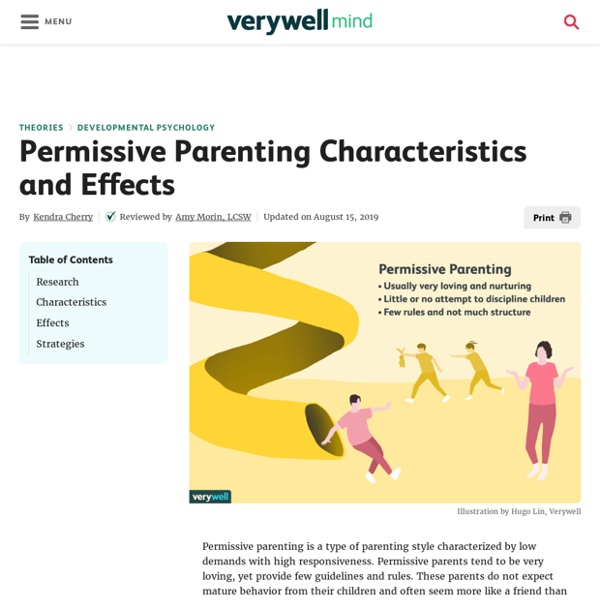What Is Authoritative Parenting?
Authoritative parenting is characterized by reasonable demands and high responsiveness. While authoritative parents might have high expectations for their children, they also give their kids the resources and support they need to succeed. Parents who exhibit this style listen to their kids and provide love and warmth in addition to limits and fair discipline. This approach to parenting avoids punishment and threats and instead relies on strategies such as positive reinforcement. Brief History During the 1960s, developmental psychologist Diana Baumrind described three different types of parenting styles: authoritarian, authoritative, and permissive.
Characteristics and Effects of Uninvolved Parenting
Uninvolved parenting, sometimes referred to as neglectful parenting, is a style characterized by a lack of responsiveness to a child's needs. Uninvolved parents make few to no demands of their children and they are often indifferent, dismissive, or even completely neglectful. The Major Parenting Styles During the 1960s, psychologist Diana Baumrind described three different parenting styles based on her research with preschool-age children: authoritarian, authoritative, and permissive parenting. In later years, researchers added a fourth style known as uninvolved parenting. So what does the uninvolved parenting style look like at a glance?
Characteristics and Effects of Uninvolved Parenting
Uninvolved parenting, sometimes referred to as neglectful parenting, is a style characterized by a lack of responsiveness to a child's needs. Uninvolved parents make few to no demands of their children and they are often indifferent, dismissive, or even completely neglectful. The Major Parenting Styles
Permissive parenting: A guide for the science-minded parent
© 2010-19 Gwen Dewar, Ph.D., all rights reserved Permissive parenting seems to be the "no discipline" approach to discipline. Does it damage kids? Threaten to destroy civilization?
The authoritarian parenting style: What does it look like?
© 2010-2018 Gwen Dewar, Ph.D., all rights reserved The authoritarian parenting style: Little nurturing, lots of psychological control You might have a good handle on what it means to favor authoritarian government: The blind submission to authority. The stifling of autonomous, critical thinking.
The authoritative parenting style: An evidence-based guide
© 2010 - 2017 Gwen Dewar, Ph.D., all rights reserved What is authoritative parenting? The authoritative parenting style is an approach to child-rearing that combines warmth, sensitivity, and the setting of limits. Parents use positive reinforcement and reasoning to guide children.
The Definition of Authoritarian Parenting
Authoritarian parenting is a parenting style characterized by high demands and low responsiveness. Parents with an authoritarian style have very high expectations of their children, yet provide very little in the way of feedback and nurturing. Mistakes tend to be punished harshly. When feedback does occur, it is often negative. Yelling and corporal punishment are also common in the authoritarian style.
Uninvolved Parenting Style - Traits And Effects on Children
Uninvolved or neglectful parenting is a considerably new parenting style that does away with hand-holding and guiding the children. It lets them learn by themselves. Parents could be uninvolved in varying degrees. While most parents look after the basic needs such as food and shelter for their kids, some others neglect their children completely. MomJunction gives you deeper insights into uninvolved or neglectful parenting and whether or not it is healthy for your kids.
Permissive Parenting: Its Characteristics And Effect On Children
Image: Shutterstock Daniel’s parents were highly affectionate to him. He was allowed to sleep late and wake up whenever he wanted. He was allowed to play loud music even if it disturbed the neighbors. He had his way almost all the time.
The Different types of Attachment Styles
Children who are securely attached generally become visibly upset when their caregivers leave and are happy when their parents return. When frightened, these children will seek comfort from the parent or caregiver. Contact initiated by a parent is readily accepted by securely attached children and they greet the return of a parent with positive behavior. While these children can be comforted to some extent by other people in the absence of a parent or caregiver, they clearly prefer parents to strangers.
Authoritarian parenting: What happens to the kids?
Photo by CEphoto, Uwe Aranas © 2010-2017 Gwen Dewar, Ph.D., all rights reserved The authoritarian parenting style is about being strict and stern. It insists on unquestioning obedience, and enforces good behavior through threats, shaming, and other punishments. As defined by psychologists, it's also a style associated with less parental warmth and responsiveness (Baumrind 1991). That doesn't bode well for a child's health outcomes, especially if she's growing up in an otherwise stressful environment.



